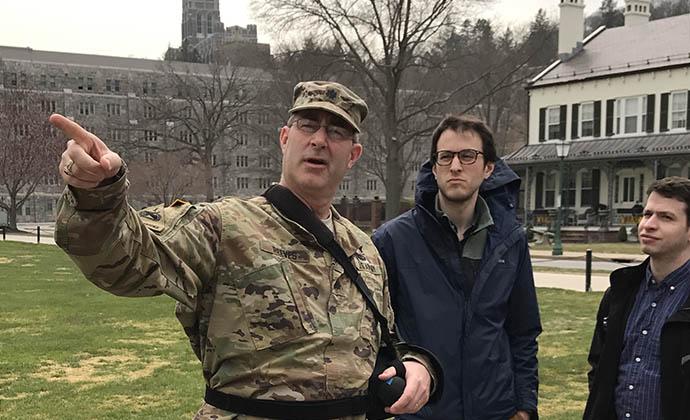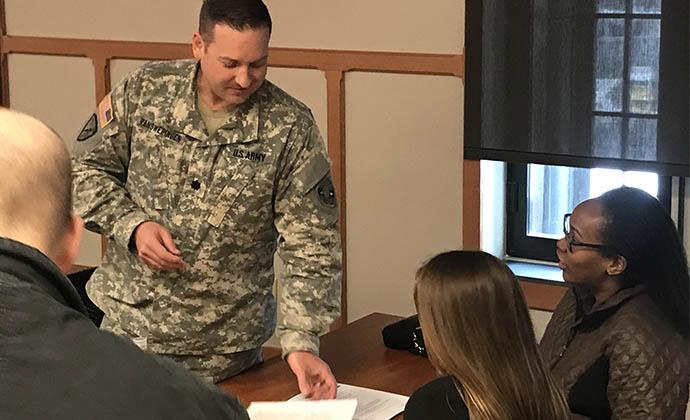Building Ties to West Point
“It’s important for civilian and military communities to talk to each other directly,” said Professor Matthew Waxman, who is leading the effort to cultivate institutional ties.
Twenty-four hours before the Trump administration announced that it had carried out strikes against Syria in retaliation for its reported use of chemical weapons, Courtney Murray ’20 was at West Point engaging in simulated law-of-armed-conflict exercises.
She and about 25 other Columbia Law students who joined Professor Matthew C. Waxman on a visit to West Point had to decide, based on hypothetical scenarios, whether United States forces could strike suspected enemy targets.
Murray, the outgoing president of Columbia Law School’s National Security Law Society, said the next night’s news made the lessons of the previous day “even more real.”
“There’s something to be said about being in a room and speaking with people who have dealt with this before in real life,” said Murray, a four-year joint degree student at the Law School and Columbia University School of International and Public Affairs.
Waxman, who runs the National Security Law Program, organized the April 12 trip for J.D. and LL.M. students as a way to further cultivate institutional ties to West Point. The group attended a constitutional and military law course in West Point’s Department of Law, ate lunch with cadets in the mess hall, and participated in exercises with Columbia Law alumni who are now members of the West Point faculty, including Lieutenant Colonel Scott Thomas Vansweringen ’16 LL.M. Two additional alumni teach at West Point: Lieutenant Colonel Christopher Jacobs ’15 LL.M. and Lieutenant Colonel Mark A. Visger ’11 LL.M. Two current LL.M. Judge Advocate General (JAG) students—Marc Washburn ’18 and Thomas Oakley ’18—will teach there next year.
A senior fellow at West Point’s Lieber Institute for Law and Land Warfare, Waxman said it’s important to give the Columbia Law community a better understanding of the military while also bringing the Law School faculty’s thinking on national security law to West Point.
“Through our alumni who go on to teach at West Point, Columbia’s National Security Law Program is influencing the next generation of Army leaders,” Waxman said. But the relationship benefits Columbia Law School students as well. “One of the things that makes a trip like this great is that it exposes students to points of view that they wouldn’t otherwise get on campus. We have a lot of discussions here about the law of armed conflict and the dilemmas of national security law, but it’s very different talking those issues through with military officers who have confronted them on the battlefield.”
Lecturer in Law Michel Paradis, who teaches seminars on the jurisprudence of war and military law, traveled with the group to West Point. Paradis, who also represents a detainee held at the U.S. Naval Station in Guantanamo Bay, Cuba, said that it is crucial to provide students “the opportunity to develop the personal relationships that will be necessary for the next generation of national security professionals.”
Lieutenant Colonel Shane Reeves, deputy head of the Department of Law at West Point, has spoken at Columbia Law School and also helped organize the trip. “We very much benefit from the expertise and opportunities that a relationship with Columbia Law School provides,” he said. “We hope the Columbia students enjoyed learning a little about military life and the training of future officers in this unique environment.”
Murray said the simulated exercises highlighted differences among how the U.S. government and other states and actors interpret international law. “The U.S. takes a little bit of a broader approach in its understanding of law of armed conflict—when you can and can’t strike,” she said, explaining what students took away from the exercise. “[T]here are people every day trying to make these split-second decisions.”
Noah Schwartz ’19, who worked in the international economics office of the National Security Council before coming to Columbia Law, said he also enjoyed the simulations.
“It gave me an appreciation for the difficulties in making those kinds of decisions.”
Schwartz said he also was glad for the chance to eat in the mess hall—“basically standing up”—where he spoke with a cadet who told him that law was one of the most popular and difficult programs to get into at West Point.
“I definitely hope to have more opportunities for these types of exchanges,” he said.
Waxman said he is already planning them. “It’s important for civilian and military communities to talk to each other directly,” he said. “How many Columbia Law School students have had opportunities to debate these issues with military officers in uniform?”
# # #
Published on April 27, 2018

